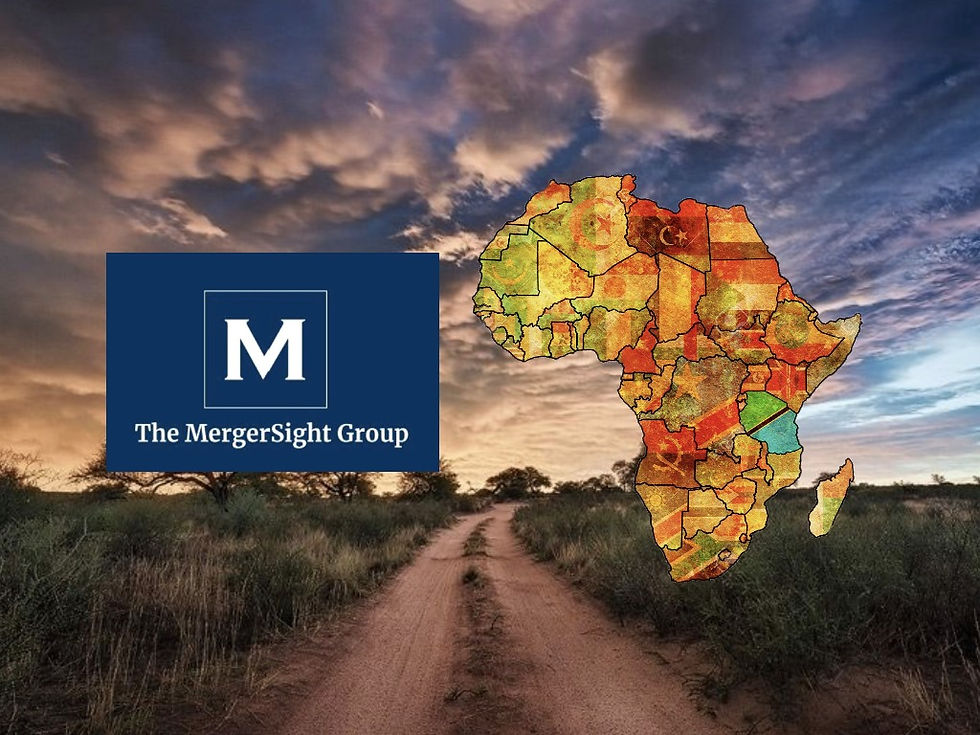Emerging Markets News - Africa
- The MergerSight Group

- Aug 31, 2020
- 3 min read
By: Tim Bamberger

General News on Africa - Trends
The overall trend for emerging markets on the continent of Africa has been on a downswing ever since the start of the global pandemic. A global decline in demand had a knock-on effect on the supply of ground resources needed from African countries.
Recently, the pandemic has started to massively spread throughout the continent. The dramatic effects are yet to be estimated. However, economists posit that the continent once again faces a survival challenge. The economies will most likely not be able to spare efforts to build their trading relationships further nor sustain current levels. Though reports indicate that over 1.2 million humans have been infected (WHO counter), the real infection rate is estimated to be 10 to 100-fold.
South Africa - Weak Rand
Although the rand has weakened, the good news is that exports have gotten cheaper. Unfortunately, global demand has significantly declined because of the pandemic. Consequently,South Africa has experienced a 40% decline in trade since April 2020. Imports have increased in price and FDI has shifted away from the country.
South Africa has now officially entered a recession. Optimists predict a 5-10% decline in GDP. Finance minister Tito Mboweni explained that failing state-owned companies and a drastic increase in debt will lead to the largest economic contraction in the country’s history.
The shock on the night of the 11th of August — when the gold price dropped 10% — has yet again added immense pressure. Nearly 50% of the Earth’s gold reserves are located in the Witwatersrand Basin, but annual mining only accounts for around 4% on the global market. Economists have predicted large foreign investments, which have now been crushed by the pandemic as well as the gold price shock.
Angola - High Inflation
Angola has battled inflation ever since the mid-90s. With a peak of 4,146.01% in 1996, Angola is an example of a country that has experienced hyperinflation.

Angola’s economy is heavily dependent on oil and diamond exports, leaving the economy in a very vulnerable position to external shocks. At the turn of the century, the inflation rate stabilized again. In light of the global pandemic, however, the inflation rate is slowly climbing upwards, reaching 22.96 percentage points in July 2020. The country’s government is concerned about future developments and has anticipated an inflation rate of 30-35% for 2020.
With crude oil barrel prices stabilizing and the global luxury market finding traction, global demand slowly increases again. Hence, Angola’s export predictions could be expected to rise again in the near future. Interest rates remain high, due to the high inflation rate, making FDI attractive at the moment.
Rwanda - Technology Hub
A factory in Kigali presented Africa’s very first “made-in-Africa” smartphone in October of 2019. The smartphone featured a fingerprint sensor and other high-end technology. This innovation was an amazing achievement in the endeavor to promote African products and their quality.
Since the genocide of 1994, Rwanda has come a long way, indicated by its recent procurement of large amounts of FDI to promote and expand its technology hub in the heart of the African continent. Breaking news from the country are the innovations in the healthcare robotics sector even during times of a global pandemic. These robots reportedly support hospital staff by checking vitals and performing basic tasks.
Industry experts have started to call the technology hub in the capital of Rwanda the “Silicon Valley of Africa”, clearly indicating just how important this milestone was for the continent. Rwanda’s government has stated its mission is to take the country from an agricultural economy to a knowledge-based, middle-income economy over the next century.
Ethiopia - Africa's Fastest Growing Economy
In recent years, the country in sub-Saharan Africa has demonstrated the GDP increase of the continent. The growth rate of 8.5% has developed through large investments in infrastructure and the manufacturing sector. Ethiopia could be the new China.

The country has built a modern and sustainable road and rail network recently, in combination with a stable government, this presents solid grounding for future development. Investors have recently been disappointed by statements from the cabinet that the country is not yet ready for FDI in the telecoms and banking sector.
Angola’s efforts to focus on industry has come with consequences on the humanitarian side. Due to job cuts in the agricultural sector, approximately 7.7 million Ethiopians have heavily relied on support by the International Monetary Relief program.
Africa - Climate Change
Africa’s climate has risen significantly over past decades, reaching new temperature highs every year. Experts indicate, climate policies will and need to be at the political center; therefore, they present significant relevance for FDI and investors. The sole focus of African economies cannot rely on increasing trade, some efforts need to be devoted to sustainable development and the sustainable development goals set out by the UN.
